|
1.
CENTRAL/ WEST AFRICA
Prices hold firm on strong Asian demand
Once again, price gains were seen in response to strong demand for certain species by both European and especially Asian buyers, particularly from India. Ayous log prices were reported higher for all grades while acajou LM grade prices surged euro15 per m3 due to demand from Asia. Higher Asian demand also contributed to the steady upward trend in sapelli prices, pushing B grade prices to parity with European levels. Otherwise, Europe was fairly stable with prices generally
holding in tandem with rising prices and tight supply situation in Southeast Asia. Prices for okan logs, an increasingly popular alternative for ekki and other hard and heavy species much in demand in the Far East, climbed euro23 to euro251 per m3.
Sawn lumber prices were also very firm overall. Prices for ayous FAS GMS and fixed sizes both rose by euro30 per m3 due to better demand from Italy. Bilinga GMS with 30% fixed sizes also increased the price by euro30 per m3. European demand for sapelli sawn lumber pushed up FAS GMS prices by euro40 per m3 and scantlings up to euro488 per m3. Prices for okan mixed sizes in standard and better grades also edged up by euro20 per m3.
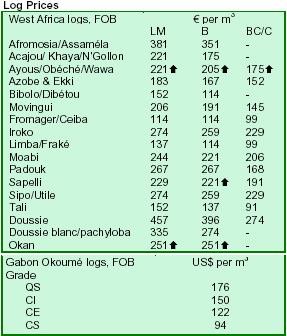
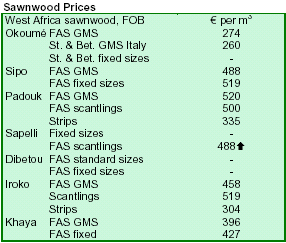
2. GHANA
Analysis shows no gains in prices
A retrospective analysis by Ghana Forestry Commission's Timber Industry Development Division (TIDD) concluded that there was virtually no improvement in prices during the last quarter of 2005. Prices were generally unstable with most species and
products experiencing drop in prices.
A market research conducted by the Contract & Permit Department revealed that the slowdown of construction activities in European countries, the major importers of
Ghana's wood products, during the winter season and the increasing supply of timber and wood products from Cameroon and Cote d¡¯Ivoire to Europe at relatively cheaper prices were the major contributing factors. Imports of flitches of various timber species from Cote d¡¯Ivoire and Cameroon by Machined Wood Limited, a
Ghanaian timber firm based in Takoradi, for reprocessing and export, was an ample indication of the relatively low prices in these countries.
The market for niangon boules slowed down drastically in the quarter under review. Prices for this product, which hovered around euro510 per m3 during the third
quarter of 2005, fell to as low as euro460 per m3 in December 2005. Market analysts said that this was due to overstocking in France and Italy, the major importers
of the product, and unwillingness of most buyers to add to existing stocks at the previously achieved levels. Prices for niangon boules had since recovered to around euro500 per m3.
Prices of rotary veneer to the USA,formerly a major importer of the product, continued a downward trend in
the last quarter of 2005. However, there was a slight improvement close to the minimum TIDD¡¯s Guiding Selling Prices (GSP) towards the later part of the quarter though few contracts were submitted for approval.
The movement of mahogany (Khaya Ivorensis) sawnwood, a species highly favoured in the USA market, slackened considerably in the period under review. Messrs Baystate Industries Inc., one of the major buyers
of mahogany, reported significant US imports of the species from Cote d¡¯Ivoire and Cameroon to the point of overstocking. This led to a slump in prices compared
with the previous achieved levels of around $850 per m3 (KD random). Prices for this product have currently declined to $745 per m3, but still higher than the
minimum GSP. Prices of wawa, which showed a sign of recovering during the third quarter of 2005, nose-dived during the fourth quarter. Wawa prices eased between
euro 5-euro18 per m3 compared with the minimum GSP.
Saudi Arabia in particular and the Middle East in general have been lucrative markets for mixed redwoods of lesser
known species. These markets have been the main destinations for danta,
edinam, candollei, khaya (Grandifolia and Anthotheca), wawabima and dahoma. Though buyers and sellers find it difficult to achieve the minimum GSP, there has been a steady rise in prices from $325 to $350 per m3 and $240 to $280 per m3 for
mixed redwoods and dahoma, respectively.
A new product, panel holders, was introduced in the export market by
Ghana's Specialized Timber Products Limited, a Kumasi based timber firm. The product was
produced using wawabima, danta, dahoma and albezzia.
Takoradi maintains leading port status for timber
Takoradi and Tema are the two main Ghanaian seaports for the export of timber and wood products. The total number of permits issued for the shipment of various
wood products through the port of Takoradi during the last quarter of 2005 was 1,643, down 9.5% from the previous quarter. Data shows that there was more and growing demand for lumber (both KD and AD) than for engineered products like furniture parts and profile boards. No permit was issued for furniture parts and profile boards during the period under review while permits for veneer layon trebled compared with the third quarter of the year.
The total number of permits issued for shipments of wood products through Tema port was 356. Total volume of exports that was shipped through Tema and Takoradi
port during the period was 103,661 m3, with these ports accounting for 29% and 71% respectively of the total shipped volume.
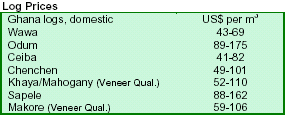
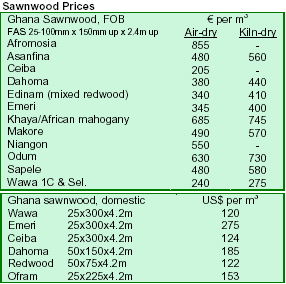
3.
MALAYSIA
Surging prices help meet higher production costs
Plywood prices, as with those of other tropical timber products in Malaysia, are pushing upwards in response to a tight raw material supply situation. Higher operation costs, such as on fuel and
labour, have also contributed to the climb in prices, albeit eroding the profit margin of most manufacturers. However, that may change for timber processors and timber products manufacturers as prices continue to surge.
Higher latex prices may hurt rubberwood logging
The shortage of rubberwood continues to bear upon the Malaysian furniture industry. With the Chinese and Thai
automotive industry driving the prices of some grades of natural raw rubber to their highest levels in the last two decades, rubberwood logging may no longer be
profitable. Moreover, rubberwood traders have become more selective in choosing their customer base. Most would now want only to sell to manufacturers who are
good paymasters, especially those who could pay upfront.
Thus, furniture manufacturers have been forced to import rubberwood from neighbouring countries such as Thailand and Indonesia. Even son, some manufacturers are crying foul, with allegations that rubberwood was being shipped out of the country, disguised as
finger-jointed furniture components.
Surging prices fuel speculation on listed companies
The surge in timber prices has also affected timber concession owners, who are of the opinion that their holdings have been under-valued for far too long. This
has led many investors to speculate on public-listed timber companies with timber concession ownerships.
MTIB will set up timber innovation centre
The Malaysian Timber Industry Board (MTIB) and the Limkokwing University will set up a 4 million ringgit Timber Innovation Centre in Banting, a town close to Port Klang, one of the major ports in Southeast Asia. Limkokwing University has a history in industrial and product design and is located in CyberJaya, the Silicon Valley of Malaysia.
MoU with Australia opens door for bilateral trade
Malaysia and Australia have signed a Memorandum of Understanding (MoU) to foster trade in agriculture, food
processing, livestock and fisheries. The MoU underpins private and government-sector links, including training and exchange programmes, joint studies, better links between research and development activities as well as
information exchanges on natural resource management and water policies. Malaysian exports to Australia were worth $4.4 billion last year. Malaysia is Australia¡¯s twelfth largest export destination and the seventh largest source of imports. Key imports are cocoa, spices and wood products.
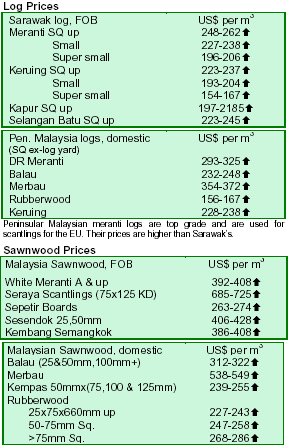
4.
INDONESIA
Logging activities set to resume in Aceh
Forestry Minister MS Kaban signed a Memorandum of Understanding (MoU) with the Aceh and Nias Rehabilitation and Reconstruction Agency (BRR), which issues licenses to five forest concession holders (HPHs) to resume activities to meet demand for around 200,000 m3 to build houses for tsunami survivors.
¡¡ÀThe government, BRR and the public will monitor the activities of the five HPHs to ensure compliance with existing regulations¡¡À, Mr. Kaban said. The HPHs include PT Raja Garuda Mas (RGM), Aceh Inti Timber (ATT), Najamussalam and Kruing Sakti.
Indonesia scraps plans for large oil palm plantation
Indonesia announced at the recent UN COP 8 meeting of the CBD in Curitiba that it would end plans to establish a 1.8 million hectare oil palm plantation in the rainforest of Borneo, which were backed by Chinese investors. The announcement was part of the initiative by the governments that share the island of Borneo (Indonesia, Brunei and Malaysia) to protect the ¡¡ãHeart of Borneo¡¡À.
The initiative aims at protecting 220,000 km2 of tropical rainforests across the island which contains one of the
ecosystems with the most biodiversity.
Repatriates can help lift beleaguered industry
The escalating prices of timber products in Malaysia have spilled over to Indonesia. However, unlike Malaysia
which has good nation-wide infrastructure and a progressive timber sector, Indonesia is handicapped by a timber industry beset with aging machineries and a sagging international public image.
Thus, only timber companies close to major Indonesian ports and with good credit facilities with local financial institutions are in a comparatively better position. Moreover, Indonesia stands to gain from the thousands of Indonesian skilled workers repatriated by the Malaysia government over the last few years. Many of these workers served in the plantation and construction industries in Malaysia. Their skills and inputs could be
put to good use by the Indonesian timber industry.
Illegal logging features in trade talks with USA
In trade talks conducted recently by the USA and Indonesian government, initiatives were being negotiated to curb illegal logging and environmental degradation in
Indonesia. This could also pave the way to a free trade pact between the two countries according to trade officials from both
countries.
US Trade Representative Rob Portman said at a news conference organized jointly with Indonesian Trade Minister Mari Pangestu, that illegal logging is depressing timber prices and damaging the environment in the process. This was echoed by W. Henson Moore, president of the American Forest and Paper Association,
who said that the flood of illegal timber into world markets has driven down the value of legally sourced timber from places like the USA. He added that US
timber companies are losing $460 million in business each year due to depressed prices.
The Bush administration's current fast-track authority to negotiate trade agreements expires in the mid-2007. The
US has already a free trade pact with Singapore, is negotiating one with Thailand and will be starting talks
with Malaysia and Korea soon.
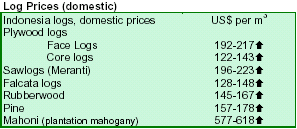
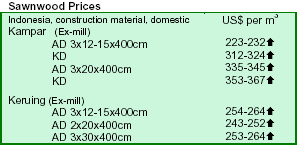
5.
MYANMAR
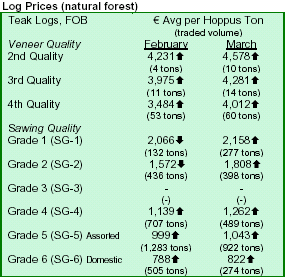
Teak log prices resume upward trend in Myanmar
Prices for teak logs rose significantly at the last tender sales, resuming their upward trend. Buyers seemed to be afraid of a short supply of teak logs and presumably went on a buying spree. Whether these prices could be sustained remains to be seen in the months to come.
Fresh hardwood logs have come out from the forests.
Prices of pyinkado and gurjan (keruing) are usually dependent on the availability of similar species from Peninsular Malaysia and Indonesia. Demand for fresh gurjan logs is relatively firm while that for pyinkado logs remains good.
Market eases as Myanmar New Year approaches
The Myanmar New Year will fall on the 17 April with holidays taking place from 13 to 17 April. April is the first month in the fiscal year when the annual stock-taking period and market activity are usually low during the first twenty days of the month.
6. PAPUA
NEW GUINEA
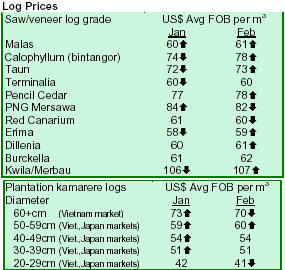
7.
BRAZIL
Authorities set at new deforestation rate for 2006
The State Secretary of Environment and Resources (SEMA), the Brazilian Environmental Institute (IBAMA) and the federal government have set the goal of reducing the rate of burning and deforestation of the Brazilian Amazon in 2006 by 15% in comparison with 2005. In
2005, the deforestation rate in the Amazon was reduced by 31% from 27,200 km2 to 18,900 km2 as a result of the
Deforestation Prevention and Control Plan launched by IBAMA. Last year, for the first time, Mato Grosso was not ranked first in terms of forest fires. This was a result of a 34% decrease in forest fires recorded statewide in comparison with 2004.
A new deforestation control system is about to be implemented (see TTM 10/20). According to IBAMA experts, the Shared Satellite Control System is an advanced and highly precision technological tool, able to guarantee an efficient deforestation control that will help
achieve the 2006 deforestation goal.
Plywood industry ponders log sales to offset costs
In 1999 Brazil became a major pine plywood supplier worldwide propped by the depreciation of the Brazilian real and the expansion of the real state sectors in North American and European countries. The Brazilian
plywood industry grew from an installed capacity of 35,000 m3 of plywood per month in 1995 to 200,000 m3 in 2005. The municipality of Palmas in Paran¡¡¡¡¡¡ì¬¬¢ accounted
for 60% of the total domestic volume produced at the end of 2005.
However, the plywood industry has been loosing competitiveness since last year due to the steep appreciation of the real against the US dollar. Brazil has
been partially replaced by suppliers from countries such as China, Chile and Argentina in key consumer markets.
Large manufacturers have reduced production and are operating at between 30% and 50% of installed capacity.
Recent statistics show a declining trend in plywood exports. Although plywood prices are roughly at around the average level in recent years, the exchange rate is making new businesses and deals unfeasible. The appreciation of the real has meant that domestic production costs have increased in comparison with
competitors. The plywood industry has found it difficult to pass on the increasing costs to customers, since the
product is an internationally marketed commodity.
With no prospects for change in the Brazilian economic policy or diverting production to the domestic market,
the plywood industry is searching for alternatives to reduce losses, including selling its own roundwood supply. The plywood industry has found it more
profitable to sell logs to moulding and reconstituted wood-panel companies rather than producing plywood panels, since demand for pine roundwood by other wood
product segments has increased in the last couple of years. Both pine-consuming sawmills and wood-panel companies are not self-sufficient in wood supply and are
paying increasing market prices for pine roundwood.
Furniture companies set eyes on the domestic market
Most of the 479 furniture manufacturers from 13 states that attended the Fifteenth edition of
Movelsul, held in Rio Grande do Sul in March, pledged to drive production to the domestic market. These manufacturers have closed deals estimated at around $250 million during the oneweek event, equivalent to three months of production. Even with the weak US dollar, many companies are still attentive to exports and business opportunities in Africa and the Middle East where they can still be competitive in comparison with suppliers from the USA and UK. The Brazilian Association of Furniture Industries (Abim¡¡¡¡¡¡ì¬¬®vel)
projects a 5% growth in furniture exports in 2006, up from the record $1 billion in 2005.
Brazil to increase rain forest protection
Brazil will declare 210,000 km2 of rain forests as a protected area in the next three years in a campaign to alleviate the destruction of the world¡¯s largest remaining wilderness, the Brazilian Environment Ministry announced at the Eighth biannual meeting of Conference
of Parties to the Convention on Biodiversity (COP 8) in Curitiba, attended by ministers from more than 90 nations. The project is part of the Amazon Protected Areas Program, which has banned development in some regions and created sustainable development zones in
others to preserve the Amazon region, which covers 4.1 million km2 in Brazil and extends into Bolivia, Ecuador, Peru, Colombia and Venezuela.
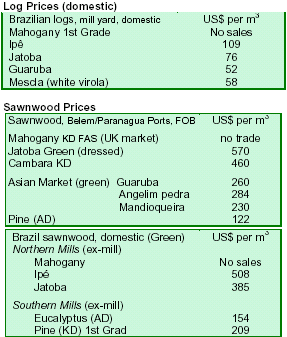
8. PERU
Peru's Mapesac obtains FSC forest certificate
Maderas Peruanas S.A.C. (Mapesac), holder of a forest concession of 21,096 ha in Ucayali, eastern Lima, was recently certified by FSC. This is the first certificate granted to a private industry concessionaire in Peru. The company produces flooring, mouldings, pallet and
wooden plugs for the export market and previously held a chain of custody certificate.
Only two other forest concessions have recently been certified in Peru, mostly belonging to indigenous or forest communities such as the
"Asociacon de Castaneros de la Reserva Tambopata" (Ascart) with 26,936 ha of natural forest and five indigenous communal forests in Ucayali (assisted by the
"Asociacon para la Investigacion y Desarrollo Integral",Aider) with 32,634 ha of mixed natural/plantation forests.
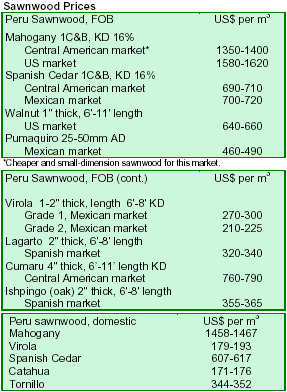
9. BOLIVIA
Expoforest 2006 exceeds all expectations
Expoforest 2006, the Bolivian exhibition fair for forestry products held on 22-26 March in Santa Cruz, gathered 150 exhibitors (up 25% from 2005) and 7,500 visitors (up 75%) from different countries. One of the side events, the Second Business Roundtable, held 1,800
business meetings (up 350%), resulting in $15.4 million in business intentions (up 126%). A total of 190 participants from 20 different countries participated in the roundtable.
Bolivia mulls excluding sawnwood from CEDEIM
The Bolivian Parliament is examining a Project of Law that would exclude sawnwood exports from the Certified of Tax Returns (Certificado de Devoluci¡¡¡¡¡¡ì¬¬®n de
Impuestos, CEDEIM). The move has generated protests in the private sector as sawnwood accounts for about one-third of Bolivia¡¯s forest product exports.
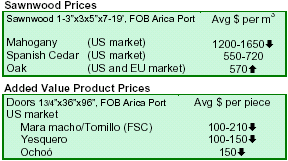
10. Guatemala
India is still Guatemala's largest teak importer
Guatemala exported 1,000 m3 of teak logs and sawnwood from January to March 2006, up 20% from 2005. About 93% of these exports went to the Indian market. Other
export markets were Italy and USA, which imported $30,330 and $15,650 in March. These countries had accounted for a combined 27% of
Guatemala's teak product exports in 2005.

11.
Guyana
Log tracking system enhances marketing of timber
In 2000, the Guyana Forestry Commission introduced a log tracking system (LTS) to assist the verification of origin of raw materials and to control the level of
harvesting within state forests. Thus, forest produce originating from Guyana and used in any part of the world can be tracked directly to the stump of the tree the wood was taken from. This has contributed positively to the marketing of Guyana¡¯s forest products.
The LTS provides detectable evidence on the legitimacy, location and magnitude of forest operations and is currently applied to all forestry operations in State
forests, Amerindian reservations and private properties. The LTS is linked to a quota system which is an initiative
to control the volume of produce harvested. The LTS is regulated by the use of log tags which are assigned free
of charge to all concessionaires at the beginning of each year. All forest produce including logs, lumber piles, poles and posts are tagged. It is the unique number of tag assigned that indicates who the operator is and therefore also indicates the geographic origin of the forest produce within the forest estate.
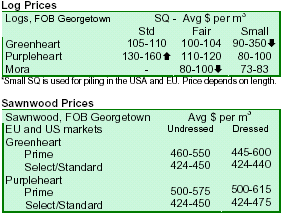
|